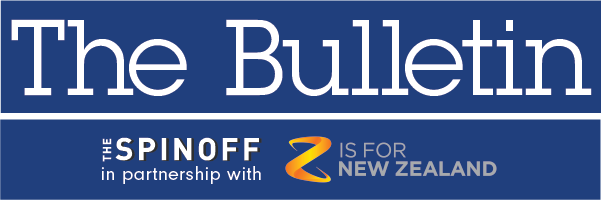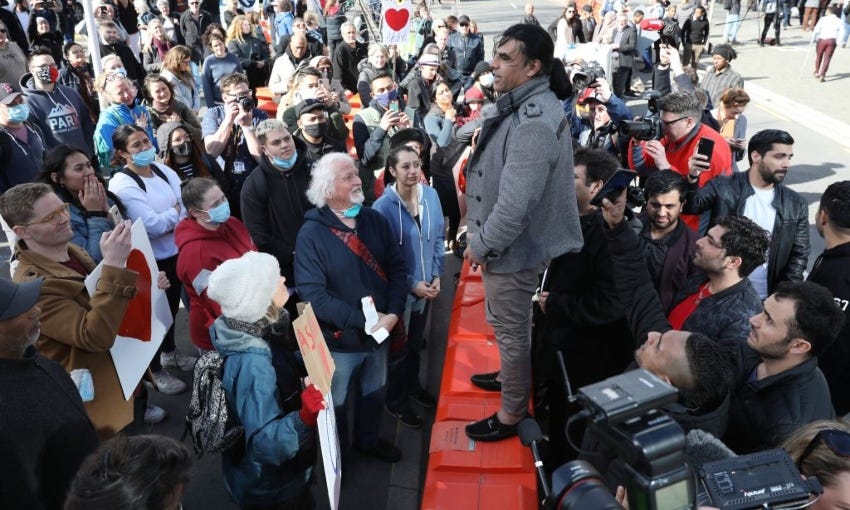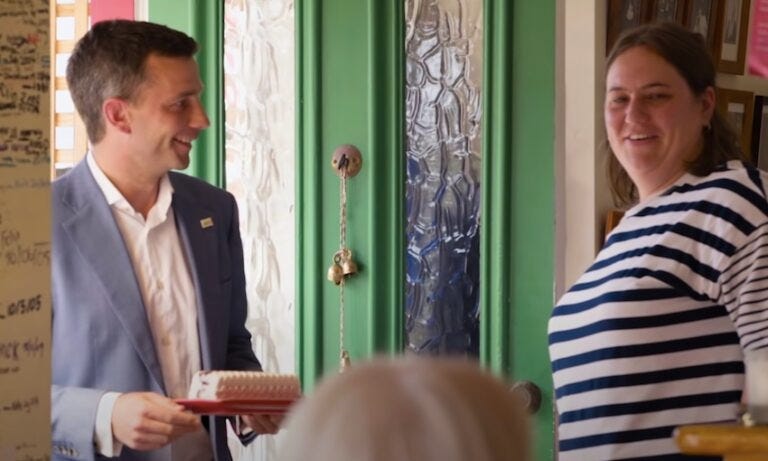The Christchurch mosque shooter sentencing, and what comes afterwards
For the murderer, a life of silently rotting behind bars. For everyone else, there are hard truths to confront

Good morning and welcome to The Bulletin for Friday 28 August, by Alex Braae for The Spinoff. Presented in partnership with Z Energy.
In today’s edition: Christchurch mosque shooter sentenced to life without parole, hundreds of millions set aside for Covid-19 vaccine, and the diverging inequalities of the economic recovery.

Image: Survivor Abdul Aziz addresses crowds after the sentencing (Getty Images)
The Christchurch mosque shooter will never leave prison for the rest of his natural life. Yesterday afternoon, a sentence of life without possibility of parole was handed down, amid unequivocal comments from the presiding judge, Justice Mander: “Even if you are detained until you die it will not contain enough punishment and denunciation.” It is the first time such a sentence has been imposed in New Zealand.
Full notes on the sentencing can be read here. I warn you – the first section describes in detail the murders and attempted murders that were committed, and are very disturbing and difficult to read. Justice Mander discussed the clear motivation for the attacks, in that they were an expression of racist and white supremacist beliefs. There was also a discussion of what factors went into the sentence of life without parole, with a notable set of paragraphs discussing that there was little prospect of rehabilitation in any meaningful sense. He will serve that sentence in New Zealand – there is no legal basis for deportation back to Australia, as some have suggested.
In the aftermath of the sentence being handed down, many of those close to the victims reacted with relief. Radio NZ carried their views, with Gamal Fouda, the imam of the targeted Al Noor mosque, saying that while no sentence could bring their loved ones back, a stand had been taken against terrorism. "They [terrorists] represent hate but we are here today - we represent love, compassion, Muslim and non-Muslim; people of faith and non-faith. That is us - New Zealanders - and we are very proud we are Muslims in New Zealand." Stuff reports crowds gathered outside the High Court, and cheered when they heard the punishment.
The PM also spoke about her relief at the sentence, reports One News. She said the killer's life being bars "deserves to be a lifetime of complete and utter silence." She also said of the victims that she hoped "you felt the arms of New Zealand round you... and I hope you continue to feel that through all the days that follow".
And what happens now? I would highly encourage you to read this piece by Abbas Nazari that deals with that question. The bigotry and hatred that led to these atrocities hasn't gone away, and as Nazari writes, it must be confronted.
"As we move forward, let us not underestimate the scope of the challenge facing our societies today. Identarian and white supremacy movements are spreading from the dark corners of the internet to the real world, with deadly consequences. The extremist who massacred 77 people in Norway inspired the Christchurch killer, who was himself referenced in the manifesto of the gunman who killed 22 people (mostly Latinos) in Texas just a few months later. It is up to us to tackle the challenge of white supremacy to ensure a tragedy such as March 15 doesn’t happen again."
Hundreds of millions of dollars will be put towards both developing a Covid-19 vaccine, and making sure New Zealand can access it quickly, reports Interest. The exact details are under wraps, for reasons of commercial sensitivity. More detail could be provided about what is being done domestically to develop a vaccine, but the figures being worked with here are comparatively smaller.
Meanwhile, we got a lot more clarity yesterday around the rules for masks. Stewart Sowman-Lund has covered a bunch of questions you might have about public transport – for example, yes you must wear one on a bus, but it just has to be a form of face covering, it doesn't have to be one of those full on surgical masks. The rules come into effect at the start of next week.
An economic recovery is taking place, but the outcomes of it are deeply unequal and driving the haves and have-nots further apart. That's the conclusion from this important analysis by Newsroom's Bernard Hickey, about the current 'k-shaped' recovery – so-called because some are going up, and others are going down. Things are going particularly swimmingly for those who own properties or stocks, and many of the country's biggest businesses are also getting some sweet cushioning from the impact, increasing their power over markets. In a similar vein, this piece on Interest by David Hargreaves has a suggestion – bring back LVR lending restrictions for property investors, who currently have a historic opportunity to sweep up an even larger share.
National has announced a range of measures they'd put in place for small businesses if elected. Stuff has covered the details, including overturning a ban on 90 day trial periods, and also scrap mandatory rest and meal breaks for workers. There would also be a rise in the provisional tax threshold, and the compulsory GST threshold. Another policy announcement is expected today, with Judith Collins in Invercargill to talk about Tiwai Point.
Green co-leader James Shaw is under fire over the decision to grant $11 million to a sustainability-focused private school for their expansion. As Alice Webb-Liddall reports, some of that criticism is even coming from former MPs from his own party – and a quick scan of Green-left circles on social media shows members are pretty unhappy about it there too. As Newshub reports, Shaw made the decision in his capacity as associate finance minister to create jobs, and basically made it alone, with education minister Chris Hipkins being more than happy to give him all the credit for it. National's education spokesperson Nicola Willis has hammered it, saying with that money she could find "a queue of schools who will create construction jobs if they're given money to do a building tomorrow."
A pretty remarkable stat about smoking rates: As the NZ Herald's Nicholas Jones reports, hundreds of millions fewer durries are being sold every year. It's being driven by both the increasing tax adding to the price, and by the increasing prevalence of addictions being switched to vaping instead.
Got some feedback about The Bulletin, or anything in the news?
Drop us a line at thebulletin@thespinoff.co.nz

Right now on The Spinoff: Jihee Junn writes about misinformation from social media influencers, and what platforms are doing about it. Business Desk editor Pattrick Smellie writes about the Emirates Team NZ investigation, and why it doesn't exactly vindicate syndicate boss Grant Dalton. A trio of University of Otago public health experts write about six months of our Covid response so far, and what needs to happen next. Business is Boring speaks to the founders of brand new fashion media website Ensemble. Alice Snedden hosts a dinner party to get various views on the euthanasia referendum. Sherry Zhang speaks to a bunch of MPs who got their political starts in the youth wings, and one who didn't.
And if you're reading this Bulletin right now, you're probably at least the tiniest bit curious about how it all gets put together. Well, my boss Duncan Greive is curious too, so he asked me to be interviewed on an episode of his podcast The Fold – I attempt to explain some of the process, and why it's something I'm still so passionate about a couple of years in.
For a feature today, a look at a cascade of crises in California. The Economist (requires free login) has reported on the current spate of wildfires in the US state, and how tackling them has become a nightmare because of other simultaneous problems – not least Covid-19. Here's an excerpt:
Previous fires have often been man-made. One started when a car tyre blew and the wheel’s metal rim scraped the pavement. This year’s fires show a different man-made influence: climate change.
On August 16th a monitoring station in Death Valley, on California’s border with Nevada, measured a temperature of 54.4°c (130°f). If confirmed, it would be the highest reliably recorded temperature anywhere on Earth. It may reflect a broader trend of global warming hitting Californians harder than most. According to the National Oceanic and Atmospheric Administration, temperatures in many parts of the state, including Santa Clara County, which is being scorched by the largest of the fires, have risen by 2°c in 1895-2018, roughly twice the global average.
The state is drier as well as hotter. California has experienced droughts throughout history, but the one between 2011 and 2019 was the longest and driest recorded. According to a study in Nature Geosciences in 2019, that drought killed almost 150m trees, leading to a state of emergency in 2019 intended to help reduce the huge build-up of flammable dead wood.
A strike is sweeping through American sport after the latest murder of a black man by police officers. This piece from a group of ESPN writers details exactly how it started in the NBA, and what discussions were had by players afterwards. At the time of writing, reports suggest that the season will continue. But as this piece shows, it quickly spread to the WNBA, Major League Baseball, and Major League Soccer, showing athletes across the board have had enough of pretending that these incidents are at all normal or acceptable.
That's it for The Bulletin. If you want to support the work we do at The Spinoff, please check out our membership programme




